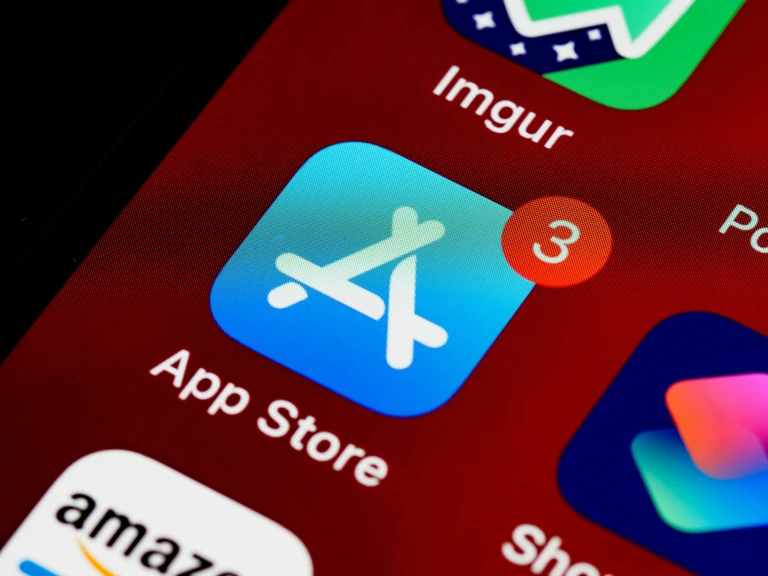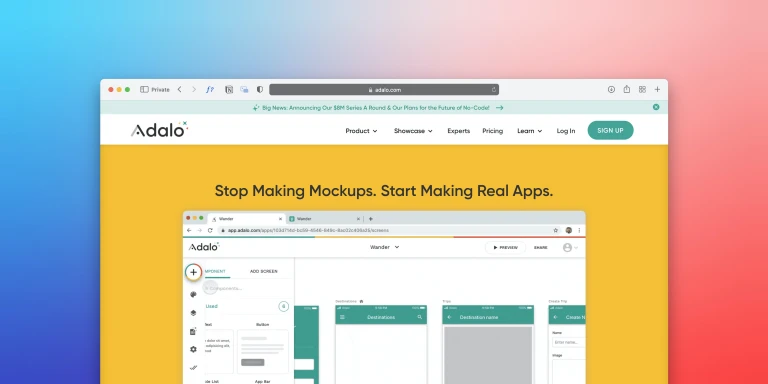How to build an app without code
HOME / / How to build an app without code

How many times a day do you open up an app on your phone? Once? Five times? Ten? In 2022, apps have become integral to how most of us live and conduct business.
There are apps for shopping, apps for exercising, apps for relaxing, apps for banking, apps for planning, apps for socialising, apps for communicating, apps for finding stuff... basically, if you can think of something you do regularly, there's probably an app for it.
And it's not surprising. In 2022, mobile phones accounted for over 60% of web traffic, while computers and laptops accounted for just under 40%. And in business, 50% of B2B (business to business) enquiries are now placed on mobile.
So if you've ever wondered should my business have an app, now could be the time to take your idea seriously.
Why should your business launch an app?
There are many benefits to launching your own business app, which will come down to the app's purpose. For example, you could launch an app so that your community has a dedicated space to connect. Or to sell your products directly to your customers (without having to pay commission to third-party sites like Amazon and eBay). Or you might want to improve your clients' experience by providing a bespoke tool for managing their accounts or staying up to date on a project.
Some of the benefits of launching a business app include:
Offer a new service or a different way of accessing your services;
Improving your customers' experience;
Having a way to communicate directly with your customers/clients at all times;
Increasing customer engagement and building community;
Standing out from your competition;
Building brand loyalty;
Improving your digital presence.
Even with all of these potential benefits, it could be difficult (in the past) to justify investing in your own app. Launching an app usually meant paying a developer or an agency to scope and design your app for you (unless you were lucky enough to know how to code yourself). This would typically cost thousands and thousands of pounds (a more complex app could easily run to tens of thousands) and would require months of development and testing.
The good news is that today it's easier than ever to launch your own app, thanks to the rise in something known as 'no code'.
What is no code?
No code is the name given to a huge collection of software and platforms that let anyone - not just trained developers - build powerful apps for your business. You'll get the idea if you've ever used WordPress, Wix or Squarespace to build a website; no code is like WordPress but for software and apps.
Most no-code tools have replaced writing code with visual development - meaning you can make an app do something or look a certain way by choosing an element from the menu and dragging and dropping it where it needs to go. There are a bunch of different no code tools available now, which let you build anything from online stores to community spaces to project management dashboards yourself.
What are the benefits of building an app with no code?
Other than the cost savings associated with building an app using no-code tools, there are a number of reasons why you should consider getting started this way.
Max Haining, a no code specialist and the founder of 100 Days of No Code, said:
"No-code gives anyone the power to be a 'creator,’ regardless of someone's ability to pay for expensive and time-consuming coding education. It gives businesses the ability to automate existing processes and streamline overall operations.
"It gives marketing teams the ability to create growth tools, designers the ability to create working prototypes of the features they are designing to show to product managers, and organizations the ability to test and build 'experiments' they would not commonly take as a way of rapidly iterating through their product roadmaps."
So as a business owner, there are three main opportunities you might want to consider:
You could launch an entirely new business or product - i.e. an app - using no code tools to get to market quickly and cost-effectively. If you've always had an idea for an app you'd like to launch but have been put off because you 'don't know how', no code could be your way to get started.
You can make your business processes - like customer orders, stock management or arranging meetings - simpler and less time-consuming by creating an app that automates the process.
Or you can test out digital service delivery - i.e. offering your existing service through an app (great for consultants or businesses like personal training).
Even if you ultimately want to pay a developer to build your app for you, launching a 'prototype' using no code can save you time and money. Then if your customers love using your app and you want to invest in something swankier, you'll know it's worth the investment.
How to launch an app using no code

Photo by Team Nocoloco on Unsplash
If you're itching to get started, we don't blame you. But deciding which tool or platform to use to build your app can be a tad overwhelming ('coz there are hundreds out there!). Start by figuring out the answers to the following questions:
Do I need a mobile app (i.e. downloadable from the App Store or Play Store) or a web app (works on mobile and desktop)?
How complex is my app - does it need to do just one thing or lots of things?
Does my app fall into a recognised category - for example, e-commerce or an online marketplace?
What data (information) does my app need to run (for example, if you're building an e-commerce app you'll need information about each product you want to sell)?
And what information will it collect (for example, if people sign up to your app you might want to collect their names and email addresses)?
Once you've thought about these questions, you should be able to make a decision about which no-code tool you want to start with. To help you out, we've included some of the most popular tools and explained what you can build with them.
The best no code tools to get started
Glide apps
Glide apps lets you build powerful software based on your existing spreadsheets. You can connect Glide to an Excel spreadsheet, Google Sheets, Airtable and a few other sources. It also offers hundreds of b-e-a-utiful template apps that you can choose from and customise. Check out their food ordering template (great for restaurants and food trucks), room reservation template (hello, travel and tourism businesses) and their online store template (sell anything you can think off).
Softr
If you've always dreamed of launching the next Etsy or Vinted, Softr could be the no-code tool for you. Softr connects to Google Sheets and Airtable and uses the data there to power web and mobile apps. As well as e-commerce, it also works well for restaurant bookings or take-aways, client portals or internal tools (like CRMs and recruitment portals).
Like Glide, it has a library of pre-designed templates ready to go. We also love how responsive the Softr support team is - they respond to questions quickly if you get stuck. Looking for inspiration? Check out Softr's Fashion Marketplace template, Client Portal template and Online Class template.
Adalo
Adalo lets you create native apps (that can be launched in the App Store and Google Play) using a super simple visual developer. You can pick and choose from a menu of features and functions so that your app looks and feels right for your business.
To find out more, check out their handy intro video on YouTube.
Airtable
Airtable is a bit like The Ultimate Excel Spreadsheet (expect it actually looks nice and is - we'd argue - easier to use). We've already mentioned that Airtable can be used to store data used by other no-code tools like Glide and Softr, but it's also possible to use Airtable to create simple business apps by automating processes.
Airtable connects with hundreds of other tools - including stuff like email marketing and finance tools - which means you can set up sophisticated automation to save you time and impress your clients. Airtable also works particularly well for anyone looking to improve internal processes (rather than build a customer-facing app). For example, you could catalogue your product inventory or manage your social media better.
Bubble
If you're thinking about launching an app that requires advanced functionality (i.e. it does stuff that's pretty complicated), then Bubble might be your best bet. Bubble has a steeper learning curve than some of the other no code tools, but it does let you develop sophisticated software and apps.
There are already lots of examples of entrepreneurs and business owners using Bubble to bring their app ideas to life - or even end up with a brand new software product to sell. No code advocate @NoCodeLife explains:
"No-code not only represents an opportunity for technically-minded business owners to streamline their own processes, but it also has the potential to create a second revenue stream. A good example is Andrew Vernon, whose family owns a photography business taking school photos. He used the no-code platform Bubble.io to build an internal tool to streamline almost every aspect of their business, from their calendar to their communications with schools and parents.
"He now sells access to his tool to other photography businesses, who pay him on a monthly basis to use it. Although other off-the-shelf software options are available, they prefer Andrew’s because it has been built specifically for their niche use-case.
"There’s no reason why the same process wouldn’t work for small businesses in other niches. I’m looking forward to the day my hairdresser tells me they built an online booking system with no-code and are now selling it to every hairdresser in the city."
Tl;dr
It has never been easier to launch your own app, whether you want to add a new channel to your existing business or are looking to launch something brand new. The rise of no code tools and platforms means that anyone can build their own app using prebuilt templates and drag-and-drop editors. This can save businesses time and money by cutting out the need for expensive developers and agencies.
Main photo by Brett Jordan on Unsplash

"We’re delighted to be the 2000th loan recipients!"
